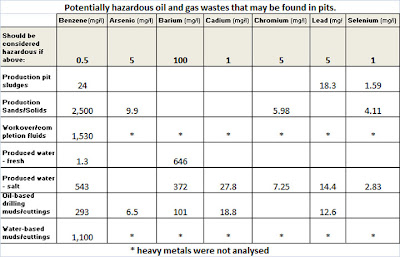YouTube stripped the sound track, Cheeseburger in Paradise out of this video so I guess you’ll just have to hum.
U.S. Fish and Wildlife Service conducted a study in December 2000 titled, Wildlife Mortality Risk in Oil Field Waste Pits. Findings from the study:
- Even if animals are not killed in the pits, the oil and chemicals in the pits can harm them later.
- Scavengers and predators can also suffer indirect effects by consuming oil-covered carcasses. (Could that apply to humans who eat meat contaminated with drilling waste?)
View a report on substances found in pits.
Between the mid-1980s and 2003, the New Mexico Environmental Bureau recorded nearly 7,000 cases of pits causing soil and water contamination. The New Mexico Oil Conservation Division released data in 2005 showing that close to 400 incidents of groundwater contamination had been documented from oil and gas pits.
chart showing pit chemicals (click to enlarge)
A more extensive list of chemicals detected in sludge pits can be found HERE along with possible health effects from exposure to those chemicals.
Tuna contaminated with mercury carries a health risk. Natural gas streams often contain mercury. Could cheeseburgers contain mercury from natural gas sludge pits?
New Mexico had 1400 cases of groundwater contamination, 400 came from sludge pits.
Sludge pits are a threat to our wildlife, livestock, soil and our drinking water.
The Oil & Gas Accountability Project has a Do it Right plan for best practice in drilling.
Do it Right in Texas too!
Closed-loop systems can protect our wildlife, livestock, air, soil, and drinking. Industry can save money using a closed-loop system instead of pits.
Here, drilling waste is sprayed on a field in Booger County where cattle are grazing. This cavalier attitude toward toxic waste must stop!
I sent this post to the following:
House Committee on Agriculture & Livestock:
Yvonne Gonzalez Toureilles (D)
Charles “Doc” Anderson (R)
Betty Brown (R)
Joe Crabb (R)
Richard L. “Rick” Hardcastle (R)
Joe Heflin (D)
Tim Kleinschmidt (R)
Tara Rios Ybarra (D)
David A. Swinford (R)
About Sharon Wilson
Sharon Wilson is considered a leading citizen expert on the impacts of shale oil and gas extraction. She is the go-to person whether it’s top EPA officials from D.C., national and international news networks, or residents facing the shock of eminent domain and the devastating environmental effects of natural gas development in their backyards.
- Web |
- More Posts(5121)
Good posting. I must remember that whenever I throw a couple of those “Texas T-Bones” on the pit, I must check them out the night before to see if they glow in the dark!!!
Disgusting. There has got to be some sort of trade association that would have something to say about beef cattle drinking that nasty crap.
Do you know whose cattle those are?
Great information…thanks for posting…just goes to show you the lack of concern the industry has for your property, livestock or livelihood… you can’t count on the industry to do as they promise they will do once you are leased… They will turn your property into their own personal toxic waste dumps.
What is the black stuff shooting out of the black pipe? The cattle in this pic surely must have ended up with it all over their skin.
Once you lease your land, “they basically own it”–they will let you live there as long as you are willing to put up with them–if not, just move!
That black stuff is some kind of drilling waste. Probably mud.